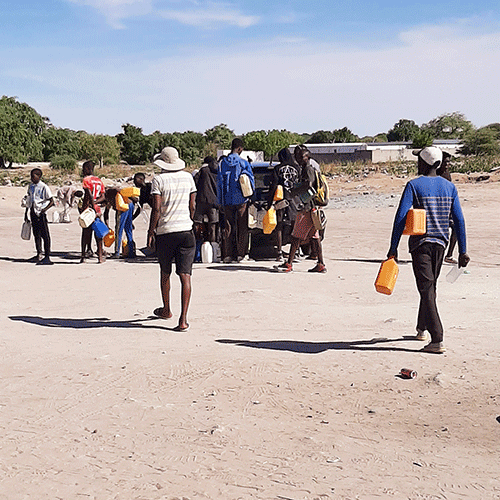As consumers are still reeling from the largest-ever fuel increase in the country’s history this week, vehicle owners are flocking to the Namibian border town of Oshikango in order to fill up their tanks.
These more affordable refills are preferred over the current astronomical pump prices of N$19.10 per litre for petrol and N$20.23 per litre for diesel (Walvis Bay prices), and are conducted at makeshift service
stations.
This is where illegal fuel sellers emerge from the bushes to offer cheaper fuel smuggled from Angola, Namibia’s oil-rich neighbour.
Between March 2021 and March 2022, the domestic petrol price increased from N$12.65 to N$17.15, while diesel increased from N$12.68 to N$17.28 per litre.
This represented an increment of N$4.50 and N$4.60 in petrol and diesel, respectively, within a period of 12 months. In comparison to the previous years’ fuel tariffs, the fuel price increase between March 2018 and March 2019 was N$0.35 on petrol and an N$1.40 increment on diesel. Between 2019 and 2020, the petrol price increased with N$1.00 and N$0.20 on diesel. During the last 12 months, as the global and domestic economies are struggling to recover from the impact of the pandemic, constrained supply lines and overwhelming inflation, both petrol and diesel prices have increased by about 51% and 60%, respectively. Now, budding entrepreneurs, although selling illegal fuel,
have decided to benefit in the same way that international oil companies are raking in massive profits.
They sell their fuel smuggled from under a tree at Oshikango, where motorists purchase five litres for between N$35 and N$45, depending on the seller.
The same amount of diesel at a licensed service station will now cost a minimum of N$101.15. The government, through the ministry of mines and energy, says these informal fuel traders are breaking the law and can be prosecuted.
In fact, over the years, this practice has landed many illegal fuel traders behind bars. But somehow the benefits of making a profit seem to outweigh the risk of poverty as more traders are becoming visible and trading around Oshikango.
Some illegal traders told this reporter that business is booming these days as more Namibian consumers simply cannot afford the high domestic fuel prices.
Deputy minister of mines and energy Kornelia Shilunga has warned that no person is allowed to buy stolen fuel, or sell imported fuel without a permit.
She said Angolan traders do not hold licences or documentation for selling fuel in Namibia, and are thus not permitted to engage in the activity.
Shilunga vowed that her ministry will leave no stone unturned to stop this illegal trade.
“This is a damage to the legal traders, as service stations in Oshikango are no longer getting buyers,” she stressed.
Meanwhile, the sellers, who are mostly Angolan nationals, say they buy fuel in bulk and make use of illegal border crossing points to smuggle their stock into Namibia.
Northern Namibian bus and taxi drivers are said to be the most regular clients.
A taxi driver who was fuelling up his vehicle when this reporter visited the makeshift service station said “the fuel price in Namibia is just too high”, and is killing their business.
“If I fill up at a local [legal] service station, I will not even take a loaf of bread home. But with the Angolan fuel, I am able to sustain my business and feed my family,” he added.
This situation has, however, negatively affected the legal fuel providers in Oshikango.
One legal service station owner blamed government for “not doing enough to halt the illegal sales of fuel in the region.”
He said the practice is seriously weighing down their legal operations.
“We have been talking; our pleas are in vain. How are we expected to pay tax? How can we create employment if our businesses are not protected? If you just observe, from Ongha to Oshikango, the fuel business is no more profitable…it is gradually dying,” said the service station owner, preferring anonymity.
Recently, police chief Sebastian Ndeitunga noted the increased prices of fuel in Namibia, and acknowledged this as the reason why people buy fuel unlawfully.
He said this is why Angolan nationals are taking advantage of Namibia’s precarious situation. The police chief added that the ever-increasing number of traders is, however, becoming a challenge as they are unable to “arrest them all.” Ndeitunga urged police officers based at the border town not to shoot or injure fuel smugglers, but to rather arrest them for prosecution. - fhamalwa@nepc.com.na


